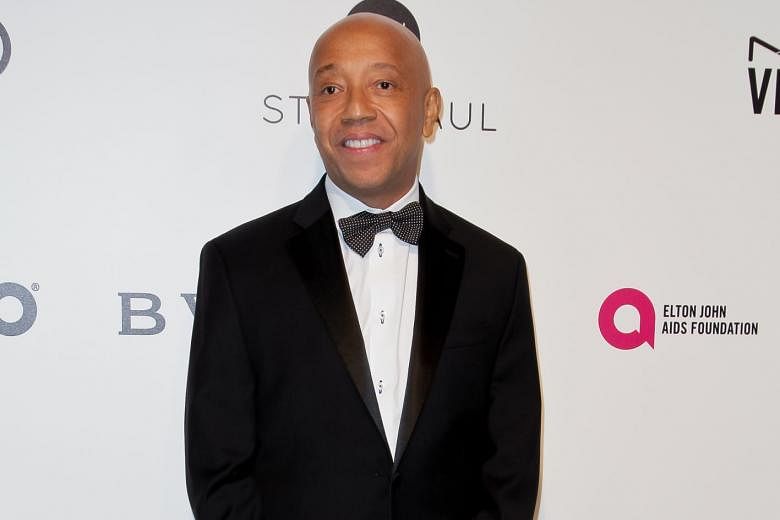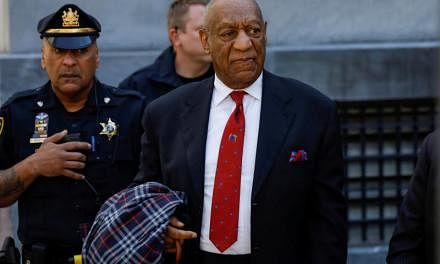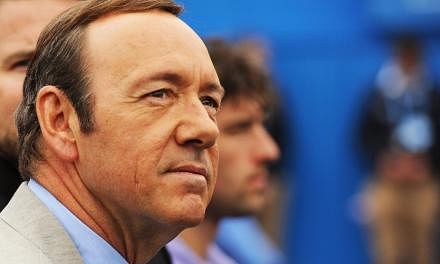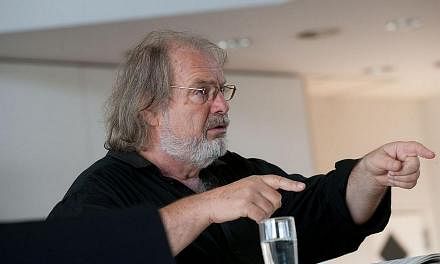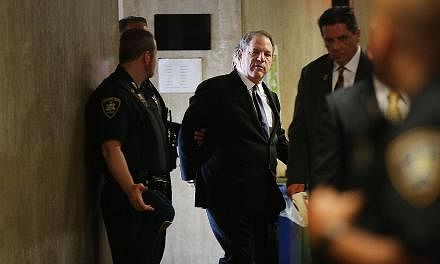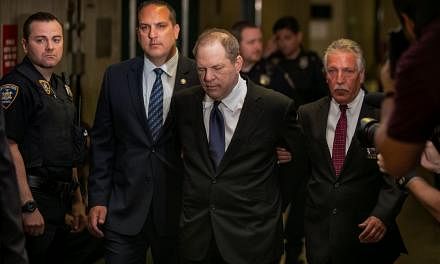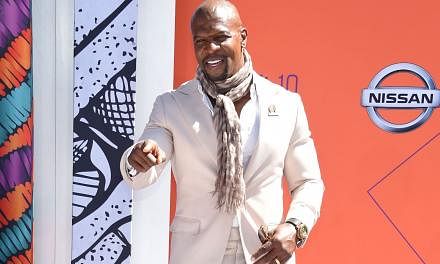(NYTIMES) - In 1995, Drew Dixon was working her dream job as an executive at Def Jam Recordings, helping to oversee a chart-topping album and a ubiquitous single by Method Man and Mary J. Blige. But as her star rose, Dixon, then 24, was spiralling into depression, she said, because of prolonged and aggressive sexual harassment by her direct supervisor, rap mogul Russell Simmons.
On work calls, he would talk graphically about how she aroused him. At a staff meeting, he asked her to sit on his lap. He regularly exposed his erect penis to her. Late that year, Simmons raped her in his downtown Manhattan apartment, Dixon said. She quit Def Jam soon after.
"I was broken," she said.
In recent interviews, four women spoke on the record about a pattern of violent sexual behaviour by Simmons, disclosing incidents from 1988 to 2014. Three of the women say that he raped them.
In each case, numerous friends and associates said they were told of the incidents at the time. The women said they were inspired to come forward in the aftermath of the accusations against Harvey Weinstein, as victims' stories have been newly elevated and more often believed.
Told in detail about the rape accusations and other misconduct, Simmons, 60, said in a statement: "I vehemently deny all these allegations. These horrific accusations have shocked me to my core and all of my relations have been consensual." He added: "I have enormous respect for the women's movement worldwide and their struggle for respect, dignity, equality and power."
Last month, Simmons - a forefather of hip-hop who went on to great success in fashion, media and more - apologised for being "thoughtless and insensitive" and announced he was stepping down from his companies after screenwriter Jenny Lumet became the second woman to publicly accuse him of sexual assault at the time.
"I have re-dedicated myself to spiritual learning, healing and working on behalf of the communities to which I have devoted my life," he said in his statement Wednesday. "I have accepted that I can and should get dirt on my sleeves if it means witnessing the birth of a new consciousness about women.
"What I will not accept is responsibility for what I have not done. I have conducted my life with a message of peace and love. Although I have been candid about how I have lived in books and interviews detailing my flaws, I will relentlessly fight against any untruthful character assassination that paints me as a man of violence."
Black women, especially, felt powerless against Simmons and his cohort in the small world of urban music, with several saying that misconduct against them could go unchecked because their place in the industry was so tenuous. They feared being ostracised, or worse.
Three of the women now accusing Simmons were pursuing careers in the music industry that they said were disrupted or derailed in part by their experiences with him.
"I didn't sing for almost a year," said Tina Baker, a performer who said Simmons raped her in the early 1990s, when he was her manager. "The second he agreed to work with me, my budget increased, the label was paying more attention to me," Baker recalled.
But after the assault, she said, "I went into oblivion."
Simmons was among the first to view hip-hop as a big business and cultural force. In 1983, with producer Rick Rubin, he made Def Jam the defining rap label of its era, with hits by the Beastie Boys, LL Cool J and Public Enemy.
In 1987, Toni Sallie, a music journalist for the trade magazine Black Radio Exclusive, met Simmons while on assignment. She found him to be a charming, if gruff, playboy. They ended up going on a few dates before Sallie, then 28, decided they were not a match.
But the two remained cordial, Sallie said, and in the fall of 1988, Simmons invited her to his Manhattan apartment for a party he said he was hosting for his girlfriend. When Sallie arrived, the place was empty except for Simmons, she recalled. Saying he wanted to show her the apartment, Simmons led her to his bedroom.
"He pushed me on the bed and jumped on top of me and physically attacked me," she said. "We were fighting. I said no." He raped her, she said.
Through his lawyer, Brad D. Rose, Simmons acknowledged that he had dated Sallie but denied any non-consensual sex.
About a year later, at a music conference in South Florida, Sallie said, she encountered Simmons in a hotel lobby. When he tried to lead her to a dark beach, she resisted and he attacked her, grabbing her by the hair, she said, and even chasing her into the women's restroom before she escaped to her room, where she barricaded the door. ("At no time did Mr. Simmons conduct himself inappropriately," Rose said.)
Baker, the singer, thought Simmons could elevate her career as her new manager. She had performed as a backup vocalist for Madonna and Bruce Springsteen, and, as Tina B, released pop and dance records in the 1980s.
One night in late 1990 or early 1991, she ran into Simmons at a club, and he invited her back to his apartment to discuss her career. "I didn't think anything of going," Baker said, having been there many times without incident.
This time, though, "it all got really ugly, pretty fast," Baker said. As soon as they entered, Simmons started pouring drinks and trying to kiss her, leading to a scuffle, she said. She recalled "him on top of me, pushing me down and him saying, 'Don't fight me,'" Baker said.
She was pinned on the bed. "I did nothing, I shut my eyes and waited for it to end." Simmons, through his lawyer, said he had "no recollection of ever having any sexual relations with Ms. Baker."
After the assault, Baker remained tethered to Simmons professionally, she said. She returned to his apartment for a meeting; Simmons liked to conduct business while working out in his penthouse. But as soon as he stopped exercising, she said, he pulled out his penis and moved toward her. She fled.
Drew Dixon left Stanford University in 1992 to join the hip-hop revolution.
Simmons, whom she had met through friends, was looking for a new A&R executive at Def Jam to scout talent and coordinate hit records.
She said his sexual advances started right away and became relentless.
Through his lawyer, Simmons acknowledged that he engaged in "inappropriate conduct" with Dixon while she worked at Def Jam.
Fending him off "was a full-time job," Dixon said. "It was exhausting. It was like making a record while swimming in rough seas." At the same time, Dixon knew Simmons valued her expertise. She had an ear for emerging talent, even bringing a rising Notorious B.I.G. to the office.
"I didn't want to cut off my one conduit to having any hope of a career," she said. "I thought if I could survive long enough to have a hit - a real bona fide hit with my name on it - I would move categories," from sexual object to respected colleague.
In 1995, she ran into him while waiting for a ride near his apartment. "I remember realising I was cornered," said Dixon, who said she rejected Simmons' sexual advances that night directly - "many ways to say no" - as well as explaining that she had just had a gynaecological procedure and could not have sex. He told her he didn't care, she said, "and I just blacked out." "The last thing I remember was him pinning me down to kiss me on the bed," she said. (Dixon said she had not been drinking and did not think she had been drugged; rather, she said, she had disassociated from the experience.) Simmons "emphatically states that he did not have sex with her," his lawyer said.
Post-Def Jam, Simmons re-branded his image from high-rolling modeliser to a spiritual yogi and elder statesman. He released books like Success Through Stillness and The Happy Vegan, while focusing on philanthropy and political advocacy.
Dixon said that years after her experience with Simmons at Def Jam, he apologised to her at an industry event. "He said, 'I have daughters and I do yoga now, Drew, and I know what I did was wrong, and I'm sorry,'" Dixon said.
Yet this Simmons is not the one that Christina Moore said she encountered in Miami at Art Basel in 2014. Moore, who was 26 at the time, and a friend bumped into Simmons in the elevator of Soho Beach House.
The women were lost, Moore said. Simmons suggested he knew where to go. Moore and her friend followed him; he led them to his room. "I felt duped," she said.
Immediately, Simmons began to run a bath, Moore said, and then pushed her up against a column in the room - "hands all over my body, up and down," she said. "I felt assaulted." Moore and her friend bolted.
Simmons recalled meeting Moore and her friend. He said the women followed him to his room of their own accord. His lawyer said running the bath was Simmons' "signal to Moore and her friend to leave." He denied any misconduct.
The whole interaction lasted about five minutes, Moore said, but it stayed with her. "I felt a lot of shame and guilt at ending up in that situation," she said.
When reports of Simmons' alleged sexual misconduct began circulating, Moore grew more alarmed and decided to come forward. "I would hate to think what would have happened if I were alone," she said.
Baker, too, spent years feeling guilt over how she handled the situation with Simmons. After the Weinstein revelations, "I started to get very agitated and emotional," Baker said, scanning for mentions of misconduct by Simmons. She concluded that she had a "moral duty" to tell her story.
Sallie said speaking out was a form of affirmation, and relief. "I still cry," she said. But, she added: "I'm happy that the truth is coming out. I'm ready."
